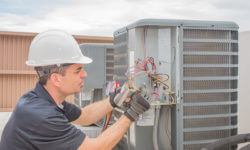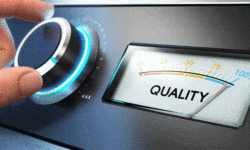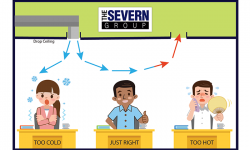In most cases, commercial HVAC systems simply provide comfort. However, healthcare facilities demand much more out of their HVAC. In fact, modern hospitals can’t function without a working HVAC system. Why? Because they help keep doctors and patients healthy and safe. Therefore, it’s very important to have a team of HVAC professionals who understand the unique needs of a hospital. And, this is not something every commercial HVAC contractor is familiar with.
Read more →Believe it or not, summer is just around the corner. That means it’s the perfect time to perform some preventative maintenance to get your HVAC system ready for warmer weather. Need a reminder of what springtime HVAC maintenance entails? Here are some commercial HVAC prep tips to get you started.
Read more →At The Severn Group, we see a lot of commercial HVAC problems. Businesses all throughout Maryland and the Washington metro areas call on us to maintain and service their systems. As such, our team has seen it all, from the minor problems to the major ones. Here are some of the most common issues that facility and operations managers may run into.
Read more →No one likes to be misinformed, especially when it comes to heating and cooling your building. And, before you can properly maintain your company’s HVAC system, you have to know what not to do. So, to help separate fact from fiction, here are 4 myths about commercial HVAC systems to be aware of.
Read more →Indoor hotel pool rooms present a unique challenge when it comes to HVAC solutions because of all the water that evaporates from the pool. Condensation – which happens when your indoor pool humidity levels are too high – is a big problem. And, not just for the pool itself, but for the building materials and indoor environment as well. To help ensure you get the most out of your hotel’s indoor pool, you need to get the dampness under control. Here are some issues that can occur from excessive indoor pool humidity and how to solve them.
Read more →A safe, comfortable work environment is important for employee satisfaction. Considering this, you wouldn’t want employees to use broken equipment or have to sit under a leaky ceiling. And, the same goes for air quality. If your office has poor indoor air quality (IAQ), the employees’ health, productivity and overall comfort will be affected. Here are five things you can do to improve indoor air quality in your office building.
Read more →If you are interested in generating energy savings in the home, an HVAC economizer may be the way to go. For most homeowners, saving energy is a necessity and upgrading your HVAC system is a great way to see a significant change in overall energy usage. Read on to learn more about the benefits of an HVAC economizer, as well as how it works and where it can be installed.
Read more →When constructing new buildings today, companies are opting for an airtight facility. Airtight buildings have the ability to increase energy performance and at the same time, lower the facility’s carbon footprint. Before constructing an airtight building, or upgrading a commercial property, it is important to review certain factors. Below is a short guide on airtight buildings and energy performance, providing insight into the pros and cons of sealing a property.
Read more →Few people think about their heating, ventilation, and air conditioning system before they purchase or rescue their pets. However, it is something you should consider for you, your family, and your pet. These are some HVAC tips for pet owners that make living with your pet a much healthier experience.
Read more →In heating, ventilation, and air conditioning (HVAC) there are systems that cool and heat forced air. Forced air is a central heating system that uses air as its medium to transfer heat. This system relies on vents, duct work, and plenums for building air distribution that is separate from actual cooling or heating systems.
Read more →









